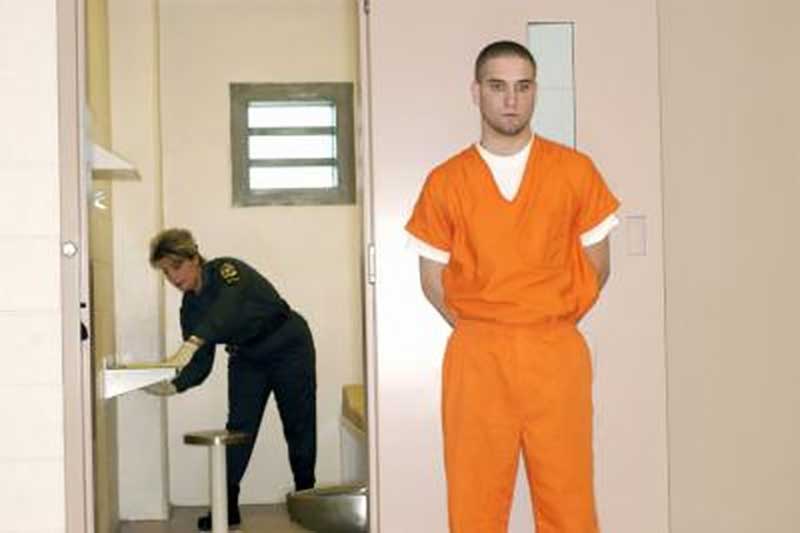Are you interested in criminal justice? Want to know what a corrections officer does? If you are confident, athletic, stable, persistent, and practical then corrections officer may be a good career path for you. Although some offenders may be ornery, many are looking for rehabilitation through work assignments, counseling, and educational opportunities. It is a challenging job that can be very rewarding.
What Does a Corrections Officer Do?
A corrections officer is responsible for enforcing rules and regulations in a prison or jail. They oversee both those arrested awaiting trial and those who have been sentenced and are serving time in prison. By enforcing the rules and regulations, the corrections officer is preventing any disturbances or injury to fellow inmates and prison staff.
According to the U.S. Bureau of Labor Statistics, a corrections office may be responsible for enforcing rules, supervising the activities of inmates, inspecting facilities, searching inmates for contraband, reporting on inmate activities, and escorting inmates for transport.
What Education Do You need to Become a Corrections Officer?
You can become a corrections officer with a criminal justice training diploma from an accredited trade school. This training program focuses on entry into state, local or federal law enforcement, corrections, and private security. Upon graduation, you can decide to work in homeland security, corrections, corporate security, and crime scene investigation to name a few.
How Long Does It Take to Become a Corrections Officer?
You can earn your criminal justice diploma in as little as nine months, studying full-time. This is the easy and comprehensive way to learn the curriculum needed to find work as a corrections officer. If you want to expand your education and career outlook, you can also extend your program by six months to earn a degree.
What Do You Learn in a Criminal Justice Trade School Program?
Criminal justice is a broad field, and there is a lot for you to learn, starting the first day. Your studies will kick off with an introduction to criminal justice. This covers the basics of the American criminal justice system, including how courts work and what criminal justice really covers.
The goal of the introductory program is to give you a general understanding of the world of criminal justice. While most people get their ideas from true crime documentaries and crime shows, there is far more legal work and technicalities involved. Therefore, working from a basic definition is the most effective way to build a solid knowledge base that will serve you throughout your career.
Here is a list of some additional classes you will take as part of a criminal justice training program.
Criminal Law
What makes a crime a crime? How does the American system determine what makes a person innocent or guilty? These questions are covered as you learn about criminal law in the United States. Studying these laws will help you understand the importance of detail and clarity as a corrections officer; when someone is charged with a crime, specific criteria must be met. This criterion goes on to affect their sentence and conditions of their release.
Criminal Procedure
When you know what determines a crime, you can then learn how those crimes are charged. Criminal prosecution has set rules and regulations in place. The purpose of criminal procedure is to promote fairness and justice for both victims and the accused; if procedure only sought to punish crime after a charge, innocent people could be sent to jail or even given a death sentence without fair trial. It is thanks to criminal procedure that offenders can receive fair judgement for their crimes and get a chance to rehabilitate through parole and community service.
Deviance and Violence
Drawing from principles of criminal psychology, deviance & violence coursework explores the reasons people commit crimes, motivations for violence and other criminal acts. You will explore the variety of mental, social, and environmental factors that can cause someone to become a criminal. Both adult and juvenile offenders are discussed, so by understanding the reasons behind illegal and violent behavior, corrections officers are better equipped to identify warning signs and help inmates make positive changes.
Criminal Evidence
Criminal evidence ties into criminal procedure, the evidence used to convict a person must meet a set list of criteria. Circumstantial evidence, for example, is often discredited because it does not prove without reasonable doubt that a person committed a crime. In fact, without the right type of evidence, even presumed guilty people have been able to avoid conviction. This course explores the definition of criminal evidence, different types of evidence and how the court uses evidence to make a conviction.
Gangs & Narcotics
Gangs play a large role in people’s lives both in and outside of prison. The psychology of gangs, as well as narcotics and drug smuggling, tie into current issues facing the U.S. criminal justice system. This course provides an in-depth study of gangs in America as well as the narcotics crises and what can be done to stop it. As a corrections officer, you are likely to monitor offenders who have gang affiliations and taken and/or distributed drugs. Rather than simply know their crime, you must be able to understand their perspective and the influence it has on their behavior.
Communication and Report Writing
Excellent written and verbal communication skills are necessary for corrections officers. In addition to writing detailed reports for the prison, you must also be able to effectively communicate with prisoners. Building trust with them is essential, and it can be difficult to get them to do what you need if they do not trust you. Improving your communication allows you to determine when an offender isn’t being entirely honest. You also learn how to ask the right questions, what details to look for, and how to write the best reports for the prison.
Intro to Corrections
Stepping into a prison is like entering an entirely different world. When a person spends time behind bars, they undergo an extensive period of adaptation known as prisonization. They must learn all the rules and expectations that govern prison life to not only fit in but also survive. When someone gets released on parole, readjusting to life as a regular civilian can be extremely difficult. This is even true for someone who has been in prison for 10 years or more.
Physical Fitness for Public Safety
Being physically adept helps you spot warning signs of violence, avoid injury, and even protect others. Part of serving the public includes being able to physically respond to threats in your environment. This course focuses on what level of fitness a corrections officer needs to do their job safely.
Final Thoughts
Does the job of corrections officer interest you? If so, it is time to look into ATA College’s criminal justice and public safety diploma program. An investment in yourself is the best investment you can make. So, start a rewarding career and help the community at large. Your community will thank you.
Want to Learn More?
Our mission at ATA College is to provide diploma and associate degree training for entry-level positions in specialized fields. Our goal is to assist you in learning new skills and/or enhancing previously obtained skills, through higher education. We strive to fulfill your needs in seeking employment in our community. We are committed to providing a quality education that instills core values which will develop work ethics, professionalism, honor, and integrity, giving you a competitive edge through any economic condition.
Criminal Justice & Public Safety Diploma
After completing the 9-month diploma program at our El Cajon | San Diego criminal justice school, students have the option to continue with courses in the Associate of Science program. The criminal justice associate degree is available in multiple emphasis pathways and can be completed in an additional 6 months after general education courses.
Contact us today to learn more about criminal justice career opportunities offered at ATA College.





